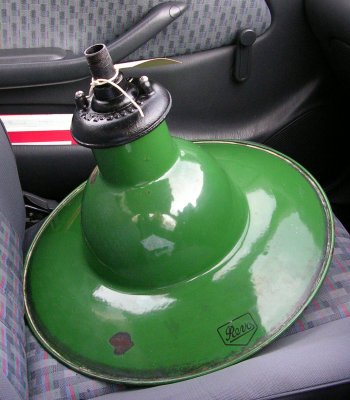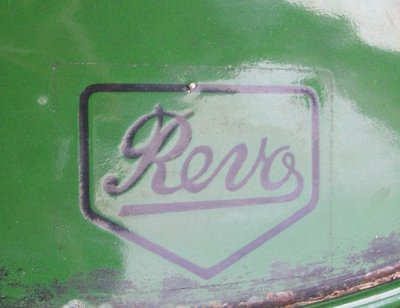for 300w Tungsten lamps (A-Group lighting)
|
At the end of
World War Two, most of Britainís street lighting was in a dire state, having
received no regular maintenance since before the beginning of the War. Towards
the end of the war in the 'Dim-out' and early post-war
period, lighting
manufacturers (now freed up from war production), began to respond to this need, by selling 'cheap and
cheerful' enamelled metal fittings. These were intended as a stop-gap measure,
at least until things
generally
improved.
The lantern in the Collection. Dating from
1947/8, this simple, but effective metal-spun lantern from REVO is an example
of post-war utility fitting. Designed for
'A-Group' main road lighting and constructed from a single-piece metal spinning,
it's finished in green vitreous-enamel. This lantern
was originally installed on Road (along with many others
of the same type), replacing earlier gas fittings. Throughout
their lives with Lytham, they burned 300w clear tungsten lamps,
and were never converted to mercury.
Originally, installed and operated in its factory green enamelled finish, these lantern were later painted into standard Lytham and St Annes Corporation cream, an subsequent repaints. The lanterns had long lives, lasting until 1973, when they were finally replaced by concrete columns fitted with Thorn Alpha-3 mercury lamps. Fortunately, street lighting collector, Dorren Harper saved this example for its scrapyard fate. After some 34 years of storage, Dorron recently took the Utility lantern out of storage, and carefully stripped the old Lytham cream paint from off it, revealling its original green viterous enamell factory finish. Following restoration, Dorron, very kindly donated this superb fitting to the MCSL Collection.
A general view of the Revo 'Utility' lantern sitting on the passenger seat of my little car. I think that this gives a good of idea of the lanterns size.
The lantern is very lightweight, and therefore only requires a 3/4 BSP gas pipe connector to mount it to the support bracket. The waterproof top cap with REVO cast into it, is made of cast iron and is the heavist component in the lantern! These were painted black from new, but got painted in all over cream in later years. My sincere thanks to Dorren for taking the time and trouble to restore this lovely old lantern.
tThere are a couple of inservice chips in the white enamel on the lantern's underside, and these are not detremental. The Edsion Golith lampholder is clearly visable. These lanterns were without glass refractors or prismatic bowls, so light distribution from them would have been totally uncontrolled.
Revo logo is well preserved under the glaze of the enamel, considering that they were 'cheap and cheerful', products, this lantern has lasted amazingly well.
|
Copyright(c) 2005 Claire Pendrous. All rights reserved.
Please note that all pictures are by Claire Pendrous, or are part of the Claire Pendrous photographic collection unless otherwise stated; none of these images can be copied without obtaining prior permission.














